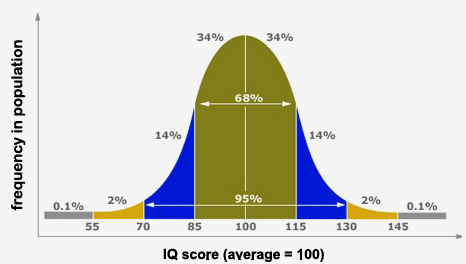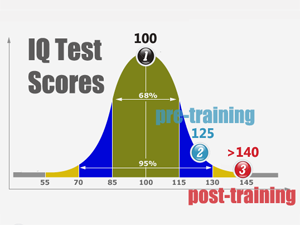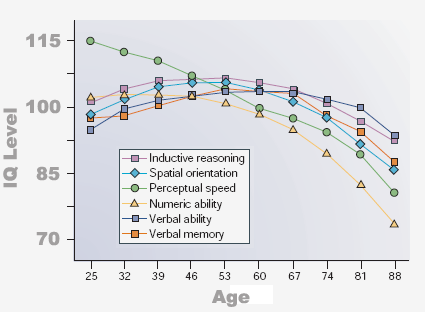IQ Tests and Intelligence
Professional, standardized IQ tests measure intelligence levels. Intelligence levels are distributed like a bell curve in the general population, with most people having an IQ of around 100. The graph here shows 68% of the population have an IQ between 85 and 115. Just 2% have an IQ greater than 130 which is Mensa standard. Harvard University students have an IQ average of between 130-140. Without systematic training, your IQ is a relatively stable attribute over the decades.

What Is Intelligence / IQ?
“Intelligence is a very general mental capability that, among other things, involves the ability to reason, plan, solve problems, think abstractly, comprehend complex ideas, learn quickly and learn from experience.” Common statement with 52 expert signatories
“…ability to adapt effectively to the environment, either by making a change in oneself or by changing the environment or finding a new one.” Encyclopedia Britannica
“…the capacity to reorganize one’s behavior patterns so as to act more effectively and more appropriately in novel situations …the ability to learn …the extent to which a person is educable …the ability to carry on abstract thinking …the effective use of concepts and symbols in dealing with a problem to be solved …” W. Freeman
“intelligence is the ability to solve problems, or to create products, that are valued within one or more cultural settings.” H. Gardner
“Achieving complex goals in complex environments” B. Goertze
Why Do We Want More IQ?
1. Increasing IQ for Self-Improvement and Self-Optimization
Increasing your intelligence and IQ level is highly satisfying in itself, resulting in better mental clarity, better comprehension, more efficient learning, and stimulating more insights and ideas. It is also a highly effective way of opening up many areas for personal growth and self-improvement – whether for successfully attaining important life goals, further educating yourself, cultivating new habits, or learning new skills such as additional languages.
Improving IQ also figures strongly in the ‘self-quantification’ movement – in which cognitive and biological capacities such as IQ and general health are measured and improved through positive feedback loops. This is part of a growing movement to optimize personal performance and potential – both physically and cognitively.
Tim Ferriss is an inspiring ‘self-quantifier’ on a mission to learn and improve performance. The New York Times describe him as “A cross between Jack Welch and a Buddhist monk.” He has a number of best-selling ‘lifestyle experimentation’ books, and his accomplishments include: First American in history to hold a Guinness World Record in tango, Speaker of 5 languages, National Chinese kickboxing champion, Horseback archer (yabusame) in Nikko, Japan, Henry Crown Fellow at the Aspen Institute, Political asylum researcher, MTV breakdancer in Taiwan, Hurling competitor in Ireland!
Dave Asprey is another blogger in the self-quantification movement. Dave and Bulletproof Executive CEO Andrew Clarke used IQ Mindware software to improve his IQ over 10 points. A review of their experience training with an IQ Mindware app – showing our software’s performance graphs during their training – is found here: How To Add 2.75 IQ Points Per Hour Of Training.
2. IQ as Cognitive Capital in the Knowledge & Information Economy

The practical advantage of having a high IQ increases as our work environments become more fluid and complex. A high IQ is of high value for any role which problem solving, decision-making and complex planning is needed. In rapidly changing, learning intensive work environments IQ is increasingly viewed as valuable ‘cognitive capital’, and there are market pressures to accumulate this capital, much as there are market forces to accumulate social capital and financial capital.
According to Jerry Muller in his article Capitalism and Inequality in the March 2013 s issue of Foreign Affairs, we live in a ‘cognitive economy’ where cognitive ability is at a premium:
“…a period of growing equality of access to education and increasing stratification of marketplace rewards, both of which have increased the importance of human capital. One element of human capital is cognitive ability: quickness of mind, the ability to infer and apply patterns drawn from experience, and the ability to deal with mental complexity. Another is character and social skills: self-discipline, persistence, responsibility. And a third is actual knowledge. All of these are becoming increasingly crucial for success in the postindustrial marketplace.”
Quickness of mind, the ability to infer and apply patterns and deal with mental complexity – these are all aspects of our general intelligence. They are all critical in our knowledge based economy.
And cognitive capital pays off in terms of income and professional success, as shown in this data:

3. Maintaining High Cognitive Functioning Under Stress and Social Pressure
Numerous clinical studies have reveal that higher salivary cortisol – a stress hormone – is linked with poorer overall memory performance (including visuospatial memory, working memory, and selective attention) – critical components of your intelligence.
Social status competition – and the pressure associated with it – can drive a person’s IQ down by as much as 20 points in just a matter of hours. Simply by being evaluated as performing less well in a work group setting can lower IQ dramatically – particularly for women. This dumbing down effect involves an interaction between the emotionally reactive amygdala and higher IQ-related centers of the pre-frontal cortex.
Our HighIQPro and gFOCUS apps are designed to minimize this negative amygdala-frontal cortex interaction, and build cognitive resilience in the face of stress, protecting IQ and cognitive performance when you are under pressure. This is an important component of EQ.
4. Maintaining High Cognitive Functioning and Brain Health with Aging
Aging entails many physical, biological, chemical, and psychological changes. The brain is no exception to this phenomenon. As we age, particularly beyond the late 40s, there is a general drop in cognitive performance in problem solving and reasoning ability, spatial ability, as well as short term memory – as the graph of average scores in a population shows.
This cognitive decline is a normal process, with cognitive decline symptoms including forgetfulness, distractibility, less efficient learning and less flexibility and power in problem solving. It is known there is a decrease in grey matter (dedicated processing circuitry) in the brain between adulthood and old age, whereas white matter (long range connectivity) in the brain increases from age 19-40, and decline after this age.
IQ Mindware training can help with improving and maintaining cognitive performance during the aging process, much as other brain cross-training strategies such as exercise, intermittent fasting and phytochemical nootropics, can help maintain the highest levels of cognitive functioning in older age.


